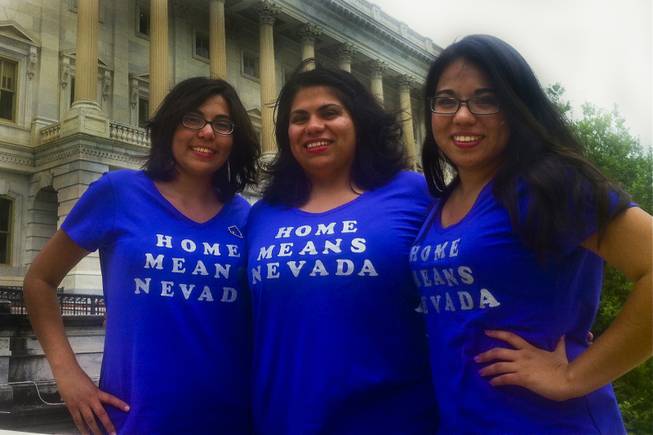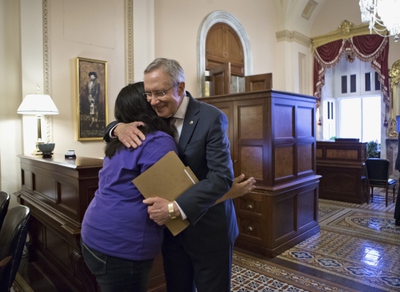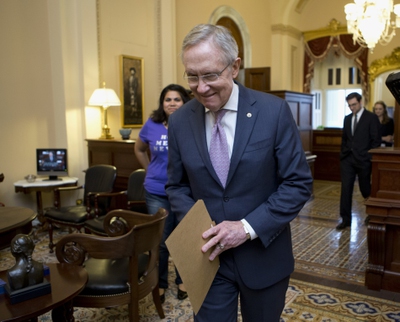
From left to right: Las Vegans Blanca Gamez, 23 and Astrid Silva, 25, both immigrants without legal permission, and Sandra Gamez, 21, a U.S. citizen, pause for a picture outside of the U.S. Senate in their “Home Means Nevada” shirts Thursday, June 27, just prior to the Senate’s final vote to pass comprehensive immigration reform.
Friday, June 28, 2013 | 2 a.m.
Two and a half years ago, two Las Vegas girls were sitting on a couch, watching C-SPAN as the Senate took a pivotal immigration vote.
Immigrants who lacked papers, Astrid Silva, now 25, and Blanca Gamez, now 23, had a lot at stake in that unsuccessful December 2010 DREAM Act vote, having worked tirelessly for Sen. Harry Reid’s 2010 re-election campaign on the belief he’d see it through Congress. But they were nonetheless shocked — and a little scared — whenever Reid referred to her publicly in the debate.
“I thought, ‘People are going to know that I’m undocumented,’” Silva recalled Thursday in an interview at the U.S. Capitol. “But it’s come full circle: Because of that vote, Blanca and I were able to be here in D.C. for this.”
Silva, Gamez, and Gamez’s younger sister Sandra, 21, who is a U.S. citizen, went to Washington, D.C., to be in the Senate chamber when 68 senators voted to pass a comprehensive immigration reform bill Thursday — and to watch as Reid once again spoke about Silva, and her life story.
“Astrid Silva is here today; I’m sure she’s in the gallery someplace, and she’ll be looking down when the United States Senate votes to expand this country’s frontiers and moves it closer to its ideals,” Reid said, after recalling how Silva had crossed the Rio Grande at age 4, clad in a frilly dress. Silva never realized she was in the country illegally until she was a teenager.

Senate Majority Leader Harry Reid of Nevada embraces Astrid Silva, of Las Vegas, a DREAM Act supporter whose family came to the U.S. from Mexico illegally and whose story has been an inspiration for Reid during work on the immigration reform bill, Thursday, June 27, 2013, on Capitol Hill in Washington. Reid carries a folder with letters from Astrid Silva that he read on the Senate floor before the historic vote.
“She spoke up. She told her story … but she’s not here alone,” Reid said. “She’s here representing millions of others just like her who have hoped and prayed for this day.”
As Reid spoke, the C-SPAN cameras couldn’t turn to catch the two girls, watching from their second-row seats in a shadowy corner of the upper balcony, behind the desks of Senate Republicans.
Even if they could, few would have been able to identify the girls in purple shirts — for bipartisanship — emblazoned with “Home Means Nevada” in glittering silver — for the Silver State, of course. The trio sat through most of the Senate vote nervously clutching one another's hands, and occasionally burying their face in a cardigan sweater to hide wide smiles and unintentional tears.
They are the people to whom the Senate majority leader had dedicated the legislation.
They watched the rare sight Thursday afternoon as 100 lawmakers, seated in their chairs, delivered their “ayes” and “nays” to Vice President Joe Biden. Not too long ago, a vote on comprehensive immigration reform seemed an impossible feat.
After years of unsuccessful attempts, the vote was a bright spot, and a testament to how congressional lawmakers torn by deep political rivalries can sometimes find common ground.
But it’s also highlighted the story of how a national movement has, through individuals such as Silva and Gamez, changed the tone of immigration in Congress.
•••
Watching the December 2010 DREAM Act vote, which came five senators short of securing the 60 necessary to avoid a filibuster, Gamez and Silva were confused. The bill, which would have given legal status to many immigrants brought illegally to the country as young children, had failed.
“We didn’t even realize that we had just lost. Because we were like, “55! Yeah!” We thought we just needed a majority,” Silva said. “We were so happy — we were cheering.”
“And then we rewinded it back, so we could see it again,” Gamez said.
“And they said ‘the measure has failed,’” Silva added.
“And we thought, what just happened?” Gamez said. “What about the 55?”
It was the first of many crucial lessons in the congressional politics and procedure that would turn the girls into experts on Washington and interpreters of arcane concepts like “cloture,” “procedural motion,” and “conference committee” to the greater Nevada immigrant community.
“The community is worried about putting food on the table and getting their kids to school. When we get caught up in the terminology of (this debate), people are like, ‘What? We just want to know what’s going on,’” Silva said.
At the same time, the girls have also tried to become ambassadors to Capitol Hill.
“They’re stuck in their marble bubble … thinking about us as this Hispanic vote,” Gamez noted. “But we’re human beings, we have emotions, we have feelings. And we’re tired of being political pawns in the game.”
Since President Barack Obama initiated the Deferred Action for Childhood Immigrants program, Silva and Gamez have both gotten their work permits and taken jobs advocating for immigration reform — Silva for Progressive Leadership Alliance of Nevada (PLAN), Gamez for the local chapter of the AFL-CIO. Gamez also works at Hermandad Mexicana, helping local immigrants deal with deportations, visas and work status.
This week, they were making personal appeals to members of the Nevada delegation.

From left to right, Nevada Rep. Steven Horsford, Sen. Dean Heller and Sen. Harry Reid laugh at a joke made by Rep. Mark Amodei, in the foreground, at the first official meeting of the full Nevada congressional delegation in several years, Feb. 13, 2013.
All members of the delegation but one — Rep. Mark Amodei, who was in a House Judiciary committee meeting marking up an immigration bill focused on enforcement and high-skilled workers when Silva and Gamez met with his staff — agreed to meet with the girls in person.
As they’ve come to know the Nevada delegation, the Nevada Dreamers — Silva, Gamez and their peers who stayed at home — have divined nicknames for most people in the state’s delegation to Congress.
Reid is their “abuelito” — grandpa. Heller is “Tio Dean” — Uncle Dean (though the girls confess, for a long time he was “that uncle that you’re like, ‘Ugh, he’s coming to dinner.’”).
“But you know, he’s growing on us,” Silva said Thursday, with a grin.
Heller’s relationship with immigration reform, they say, has been “an evolution.”
“We wanted Sen. Heller especially to know that Nevada was watching,” Silva said. “And we also wanted to tell Sen. Heller: ‘We’re going to support you, if you do this!’ We’re not just going to let him out there like a sitting duck and say ‘Thanks for voting, good luck.’”
Heller hadn’t yet committed to vote for immigration reform when he sat down with the girls Tuesday, though he had taken a public role helping to draft and advocate for a sweeping border-security amendment that supporters of immigration reform hailed as a “breakthrough” for the legislation.
“Over the past few months we’ve been talking to Heller, every time, he’s been a little more receptive,” Silva said.
Heller didn’t commit himself to vote for immigration until Wednesday. Before the vote Thursday, Gamez and Silva agreed: The thing they most wanted to see on the Senate floor was Heller vote “aye.”

Senate Majority Leader Harry Reid of Nev. walks to the Senate floor on Capitol Hill in Washington, Thursday, June 27, 2013, after meeting with Astrid Silva, of Las Vegas, rear left, a DREAM Act supporter whose family came to the U.S. from Mexico illegally and whose story has been an inspiration for Reid during work on the immigration reform bill. Reid carries a folder with letters from Astrid Silva that he read on the Senate floor before the historic vote.
“It’s been a long road with him. With Sen. Reid, we’ve always known he’s been there for us, and we appreciate it, and it’s amazing,” Silva said.
Reid, too, had an evolution on immigration reform. Early in his career, he spoke derisively about anchor babies. Now, he has staked his political reputation on backing a pathway to citizenship for immigrants who lack documentation.
“We weren’t there for that though — I was 3 or 4 years old then,” Silva said. “With Sen. Heller, we’ve seen it happening. It just shows that they’re human beings, if you just share with them your story.”
Blanca and Gamez got their wish Thursday, clenching their fists in a brief second of electric excitement when Heller said “yea.” They held hands and grinned widely when Reid, further down in the alphabetical roll call, also nodded his approval.
They are hoping for a similar moment later this year, when the House — they hope — votes on immigration reform as well.
“We’re saving up our money again. Round 2,” Gamez said. “We have to continue on as it goes to the House, or we’re going to lose the fire.”
“We know that this is going to happen. And we really want Nevada to be a part of it,” Silva said Thursday. “What more amazing thing than to say the Nevada delegation, all of it, voted for immigration reform? Because I think it’s possible.”
•••
Gamez and Silva believe fervently, as does Reid, that the House of Representatives will eventually have to take up comprehensive immigration reform.
With their part of the job done, Republican Senators who supported immigration reform are making it their cause to convince their counterparts in the House that it is the safe vote to take.
“We want to carefully address this with our House colleagues respecting the equal role they play,” said Sen. John McCain, the leading Republican in the so-called Gang of Eight who drafted the Senate’s immigration bill. He asked pro-immigration organizations to go to the House “with friendly persuasion to take up legislation and send it to us. And if it’s different, we want to sit down and work with them in conference to get this done.”
“The easy thing to do politically is nothing; the harder choice is to govern,” said Heller, arguing that Republicans could support immigration reform “and still stay true to conservative principles.”
The Nevada Dreamers think it might not be such a tough sell — at least not among the Nevada lawmakers they’re talking to.
“We spoke directly with Congressman Heck. He’s very open to it,” Gamez said. “He told us: ‘You knew me from 2010. Flash forward to now: You’ve seen my ideals move and progress forward.’ He’s evolved, and is listening — and that was something really great to hear.”

Congressman Joe Heck (R-NV) responds to a question during a town hall meeting with constituents at Pacific Pines Senior Apartments in Henderson Tuesday, Feb.19, 2013.
This month, Heck released a taped statement explaining why he had taken certain anti-immigration votes, including a vote to defund the DACA program that gave Gamez and Silva their work permits.
“We should try to find a way to give young people who were brought here illegally a chance to make life for themselves in the only country they have ever known, but I believe that the best way to do this is through the legislative process,” Heck said in the video, making a distinction between the laws passed by Congress and the administrative action taken by Obama.
Gamez and Silva said Heck told them that hearing the personal narratives of immigrants who aren't documented in his district helped shape his thinking, so they’re trying to jump-start the same sort of campaign for the northern part of the state.
“There’s such a large community of undocumented people in those communities that are scared to come out — not even like we were scared,” Silva said.
No one pretends there isn’t work ahead.
Even Reid — who described the immigration vote as a triumphant legacy for people like Silva, his immigrant father-in-law Israel Goldfarb, and the late Sen. Ted Kennedy — reserved his last words for Speaker of the House John Boehner.
“I’m confident that the House of Representatives will pass this legislation because I can see a new man standing tall, with his head high, and his heart proud, afraid of nothing at all,” Reid said, co-opting hymn lyrics into a call to service for Congress’ top Republican. “The finish line is very close to here, down this very long hallway to the House of Representatives.”
But after the vote, Thursday was a time for celebration.
After Biden announced the 68 to 32 vote, dozens of young, undocumented immigrants from a national advocacy group wearing turquoise shirts proclaiming “11 Million Dreams” chanted “Yes we can! Yes we can!” from their seats in the Senate chamber — despite Biden’s admonition to keep silent.
On the floor, Reid and Heller met in the middle for a very rare public exchange of smiles, a few whispered words of congratulations, and a pat on the back.
Gamez and Silva, meanwhile, sat in their upper corner of the chamber as it emptied out, quietly taking it all in.
“I can’t get out of my mind, that day in 2010 that we were so excited. We were cheering — before seeing, ‘the measure has failed,’” Silva said Thursday afternoon. “So I will not think that this is for sure until the president signs it.”

Join the Discussion:
Check this out for a full explanation of our conversion to the LiveFyre commenting system and instructions on how to sign up for an account.
Full comments policy